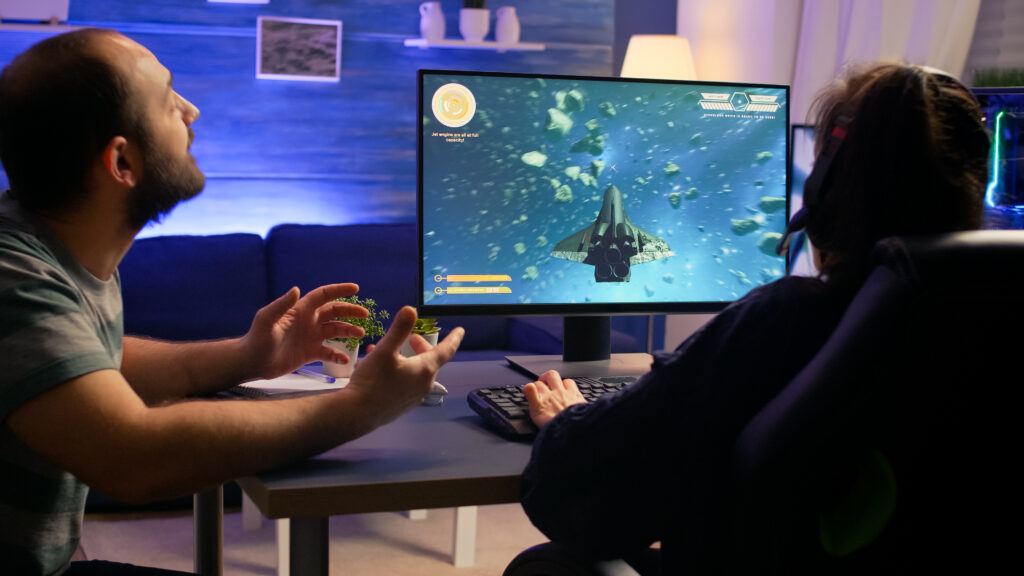
Couple of gamers making winner gesture while playing space shooter virtual championship. Defeated player with headphones streaming online cyber performing during online gaming competition.
From humble beginnings with pixelated 2D adventures to today’s vast open-world experiences, game development has become one of the most creative, fast-evolving industries in the digital world. It’s no longer just about coding a fun pastime; it’s about storytelling, emotional connection, art, physics, and cutting-edge technology all wrapped into one.
In 2025, the global gaming market continues to boom, drawing talent from every corner of the planet. Whether you’re a high school student dreaming of building your first indie title, a seasoned programmer looking for new opportunities, or simply someone intrigued by what goes on behind the screen, this post will take you on a journey through the vibrant world of game development—with a spotlight on global trends, regional talent, and the evolving job landscape.
What Is Game Development, Really?
At its core, game development is the process of creating video games. It involves a combination of storytelling, programming, design, art, audio engineering, and testing. Depending on the scale of the project, this could be done by a single indie developer or a large team of specialists working in sync.
The key stages of game development include:
-
Concept and story creation
-
Game design and planning
-
Programming (game engine integration, mechanics, AI, physics)
-
Art and animation (2D, 3D modeling, character design)
-
Sound and music production
-
Testing and QA
-
Publishing and marketing
Modern development is powered by robust tools like Unity, Unreal Engine, and Godot, which allow developers to build stunning environments and realistic physics simulations faster than ever before.
French Game Developers: A Creative Powerhouse in Europe
France has become a creative powerhouse in the European gaming scene. Studios like Ubisoft, with headquarters in Paris and Montreal, have been responsible for global hits like Assassin’s Creed, Far Cry, and Just Dance. But it’s not just about AAA titles.
A thriving indie scene is growing in cities like Lyon, Bordeaux, and Montpellier. These regions support local talent through government grants, tax incentives, and world-renowned art schools like Gobelins and ISART Digital.
French developers are often known for:
-
Their storytelling approach that blends philosophy and art (e.g., Life is Strange by Dontnod Entertainment).
-
Strong artistic direction.
-
A rich culture of collaborative game jams and innovation hubs.
The French game development scene also benefits from a strong community spirit. Events like Paris Games Week and the Game Connection Europe conference help developers network, share ideas, and showcase their work to global publishers.
The Shift to Remote: Game Developer Remote Jobs on the Rise
Like many tech industries, game development has undergone a transformation in the way teams collaborate. While once centralized in major cities, studios are now embracing remote work models—and not just temporarily.
Remote game developer jobs are booming, allowing professionals to work from anywhere in the world. This opens doors for talent from countries with less established gaming industries, as well as for those seeking more flexible lifestyles.
Why remote game development works so well:
-
Cloud-based tools and version control systems like Git, Perforce, and Unity Collaborate make working from afar seamless.
-
Communication platforms (Slack, Discord, Zoom) allow real-time discussion and agile workflows.
-
Creative roles (like concept artists, sound designers, and writers) often thrive with the freedom of remote collaboration.
Studios have found that this remote flexibility often boosts productivity and employee satisfaction. Some major studios have even moved to fully remote setups, while others adopt hybrid models. Indie teams, in particular, benefit from being able to recruit globally without geographic constraints.
Tips for landing a remote game development job:
-
Build a strong online portfolio and GitHub profile.
-
Engage in open-source or community-led game projects.
-
Attend virtual game dev meetups or Discord groups.
-
Stay active on job boards like Work With Indies, RemoteOK, and Hitmarker.
Austin Game Developers: Tech Meets Art in the Heart of Texas
On the other side of the Atlantic, Austin, Texas has established itself as one of the most vibrant game development hubs in the United States. Known for its tech-savvy workforce and creative energy, Austin is home to both indie developers and massive studios.
Key Austin game development studios include:
-
Bethesda Game Studios Austin (part of the team behind Fallout 76)
-
Arkane Austin (Dishonored, Redfall)
-
Certain Affinity (collaborator on Halo and Call of Duty)
-
Playful Studios (New Super Lucky’s Tale)
What makes Austin unique is its blend of art, music, and tech. Many game developers in the city come from diverse backgrounds—film, animation, music production—which adds a special flair to the games made there.
In addition to its creative culture, Austin benefits from:
-
Access to top-tier tech talent from the University of Texas
-
A relatively low cost of living compared to San Francisco or NYC
-
A thriving indie community supported by events like Fantastic Arcade and South by Southwest (SXSW) Gaming Expo
For aspiring developers, Austin offers a supportive ecosystem with meetups, mentorships, and coworking spaces tailored to creative tech professionals.
Challenges Facing Game Developers Today
Despite the exciting growth of the industry, developers also face challenges:
-
Crunch culture: Overworking during tight deadlines remains an issue in some large studios.
-
Job security: Layoffs have become more common, especially in studios that rely on hit-or-miss titles.
-
Mental health: Long hours, isolation (especially in remote settings), and creative pressure can take a toll.
However, there’s been a growing push for healthier work environments, unionization, and more transparent project management practices.
The Future of Game Development
As we look forward, the future of game development is being shaped by several exciting trends:
-
AI-powered tools that assist in game design, level generation, and NPC behavior.
-
Cloud gaming that allows players to stream high-end games without consoles.
-
VR and AR innovations offering immersive new experiences.
-
Blockchain and web3 experimentation in gaming economies (though still controversial and evolving).
Furthermore, diversity and inclusion are becoming central themes in hiring, storytelling, and community building within game studios. Voices from underrepresented backgrounds are helping reshape what games can be—and who they’re for.
Final Thoughts
Game development is more than just a job or an industry—it’s a culture, a creative movement, and a global community. Whether you’re inspired by the narrative artistry of French game developers, exploring the digital frontiers from a cabin in the woods through remote game developer jobs, or collaborating in the music-filled streets of Austin, there’s room for you in this exciting space.
If you’re just getting started, now is a great time to learn, build, and connect. The tools are more accessible than ever. The community is open. And the opportunities? Limitless.
So, pick up that game engine, sketchpad, or controller—and start building the future of play.






